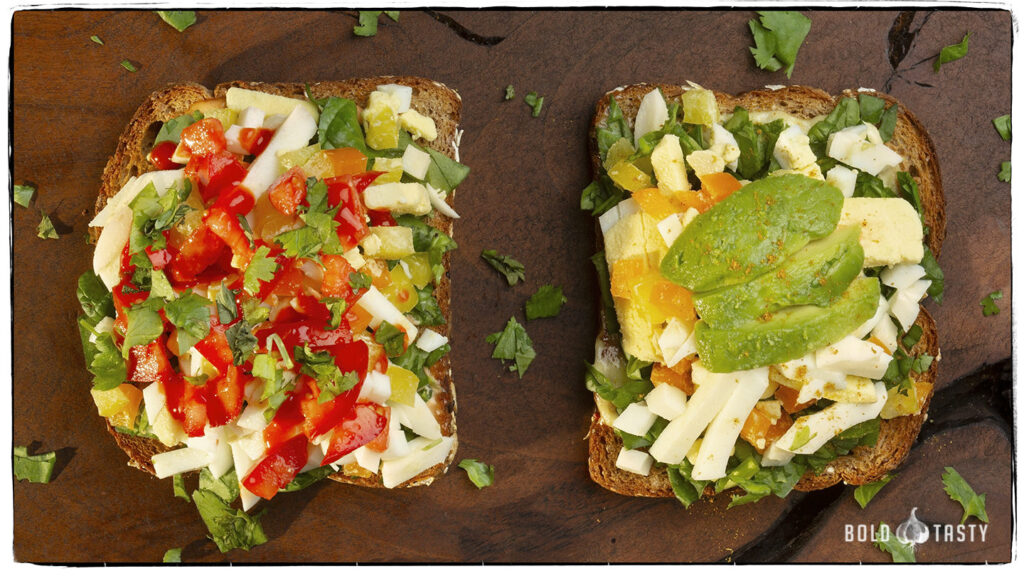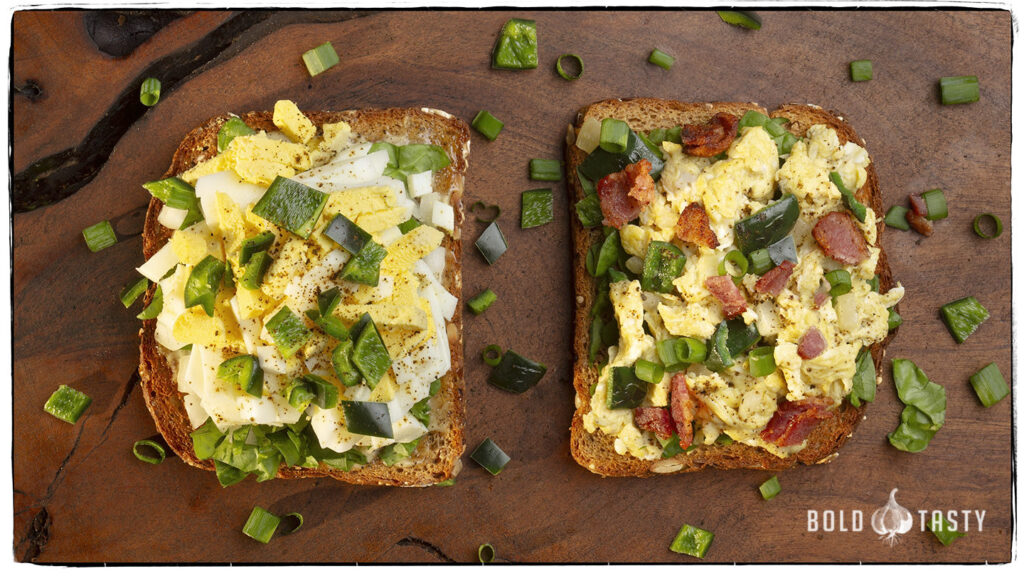Healthy Recipes
Zesty Thai Curry Carrot and Asparagus Soup – A Fusion of Flavor!
Zesty Thai Curry Carrot and Asparagus Soup – A Fusion of Flavor! Zesty Thai Curry…
Healthy Low Carb Gochujang Chicken and Vegetable
Healthy Low Carb Gochujang Chicken and Vegetable If you love bold, spicy, and savory flavors,…
Mouthwatering Chinese Curry Chicken / 1 Of My Favorite Recipes
Mouthwatering Chinese Curry Chicken / 1 Of My Favorite Recipes This Chinese Chicken Curry took…
Naked Burger Salad with Guilt-Free Dressing: A Low-Carb Flavor Explosion!
Naked Burger Salad with Guilt-Free Dressing: A Low-Carb Flavor Explosion! Naked Burger Salad a healthy…
Healthy Curry Avocado and Sriracha Egg Salad
Healthy Curry Avocado and Sriracha Egg Salad I hope you give my healthy Sriracha egg…
Smoked Ancho Mayo Egg Salad with Spinach, Poblano Peppers and Onions
Smoked Ancho Mayo Egg Salad with Spinach, Poblano Peppers and Onions Smoked ancho mayo egg…
Healthy Recipes, with Bold and Tasty Flavor!
This page is focused on healthy recipes. In early spring of 2024, I was diagnosed with type 2 diabetes. It wasn’t surprising, considering other family members are also diabetic. At the time, my glucose level was 330, and my A1C was over 13. After four months— the standard time to wait before re-testing A1C— I managed to lower it from 13+ to 5.6, solely by changing my diet. That’s right, no medication.
I love cooking and enjoy complex, flavorful food. Bread and pasta are personal favorites. While cutting out almost all sugar wasn’t too difficult, reducing carbohydrates was much harder, especially because I really love bread. Before my diagnosis, I spent most of my free time experimenting with rustic bread recipes.
I changed my diet to include more lean protein, fresh vegetables, nuts, although they can be quite expensive. In addition to reducing my sugar intake, I also lost 25-30 pounds. Healthy recipes have been a key part of keeping my blood sugar in check.
It’s important to note that I don’t have high cholesterol, which allows me some flexibility in modifying recipes for those who need to watch their intake of fatty meats and salt. However, I want to emphasize that I’m not a doctor or dietitian; this is simply my personal approach to healthy eating. Much of the information I’ve gathered about which foods are good or bad for blood sugar has come from online research, as doctors, in my experience, tend not to provide much detailed guidance in that area.
What is Diabetes?
Diabetes is a chronic medical condition that occurs when the body either doesn’t produce enough insulin or cannot effectively use the insulin it produces. Insulin is a hormone that regulates blood sugar (glucose) levels, helping cells absorb glucose for energy. Without proper insulin function, glucose accumulates in the bloodstream, leading to elevated blood sugar levels, which can damage various organs and systems over time.
There are three main types of diabetes: type 1, type 2, and gestational diabetes.
Type 1 diabetes is an autoimmune condition where the immune system attacks and destroys insulin-producing cells in the pancreas. As a result, people with type 1 diabetes must take insulin injections for life. It is usually diagnosed in children and young adults, though it can develop at any age.
Type 2 diabetes is the most common form and occurs when the body becomes resistant to insulin or the pancreas does not produce enough insulin. It is often linked to lifestyle factors, such as being overweight, physical inactivity, and poor diet. Diabetes tends to develop gradually and can be managed through lifestyle changes like diet and exercise, although medication or insulin may be needed in some cases.
Gestational diabetes occurs during pregnancy when the body cannot produce enough insulin to meet the increased needs. While it typically resolves after childbirth, it increases the risk of developing type 2 diabetes later in life for both the mother and the child.
A low-carb, no-sugar diet offers a variety of health benefits
A low-carb, no-sugar diet offers a variety of health benefits, especially for people managing conditions like diabetes, weight control, or metabolic disorders. Here are some of the key benefits:
1. Improved Blood Sugar Control
- Stabilized Blood Glucose: For those with diabetes or prediabetes, reducing carbohydrate intake can help regulate blood sugar levels, preventing large spikes that are often triggered by carbs.
- Lowered A1C Levels: This diet can lead to long-term improvements in A1C, which reflects overall blood sugar control over time. You’ve already seen this in your own health journey with the significant drop in your A1C.
2. Weight Loss & Maintenance
- Reduced Caloric Intake: Low-carb diets can naturally reduce overall calorie consumption because high-protein and high-fat foods are more satiating, leading to reduced hunger and fewer cravings.
- Fat Burning: When carbs are limited, the body often switches to burning fat for fuel, which can lead to fat loss, especially in the abdominal region.
3. Improved Heart Health
- Better Cholesterol Levels: A low-carb, no-sugar diet can lead to increases in HDL (good cholesterol) and decreases in triglycerides, which are important markers for heart health.
- Lower Blood Pressure: Weight loss, along with reduced insulin resistance from this diet, can also help lower blood pressure.
4. Increased Energy & Focus
- Stable Energy Levels: Without sugar and high-carb foods causing insulin spikes and crashes, many people experience more consistent energy throughout the day.
- Improved Mental Clarity: Some individuals report better focus and cognitive function due to steady blood sugar and fewer brain fog episodes.
5. Reduced Inflammation
- Less Processed Foods: A low-carb, no-sugar diet often eliminates processed foods and sugary drinks, which are known to contribute to inflammation in the body.
- Healthier Fats & Nutrients: Diets high in healthy fats (e.g., from nuts, seeds, avocados, and olive oil) can help reduce chronic inflammation.
6. Better Digestive Health
- Improved Gut Microbiome: Many low-carb diets promote higher intake of fiber-rich vegetables and healthy fats, which can foster a healthier gut environment.
- Reduced Bloating: Cutting out sugars and refined carbs may reduce digestive issues like bloating and gas, which are often triggered by foods high in sugar or carbohydrates.
7. Decreased Risk of Chronic Diseases
- Type 2 Diabetes Prevention: A low-carb diet can help reverse or prevent insulin resistance, which is a precursor to type 2 diabetes.
- Lower Risk of Certain Cancers: Some research suggests that limiting sugar and refined carbohydrates may reduce the risk of certain cancers by lowering insulin levels and inflammation.
8. Improved Hormonal Balance
- Insulin Sensitivity: By reducing carbs and sugar, you improve insulin sensitivity, which can have widespread benefits for metabolic and hormonal health.
- Better Regulation of Hunger Hormones: A diet higher in protein and healthy fats helps control hormones like ghrelin (hunger hormone), leading to better appetite regulation.
For someone managing diabetes like yourself, this type of diet can be particularly powerful in keeping blood sugar levels in check and maintaining the progress you’ve already made.






